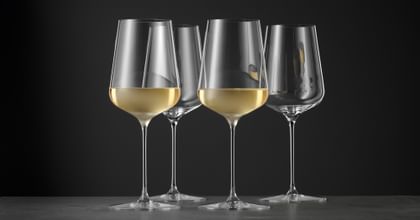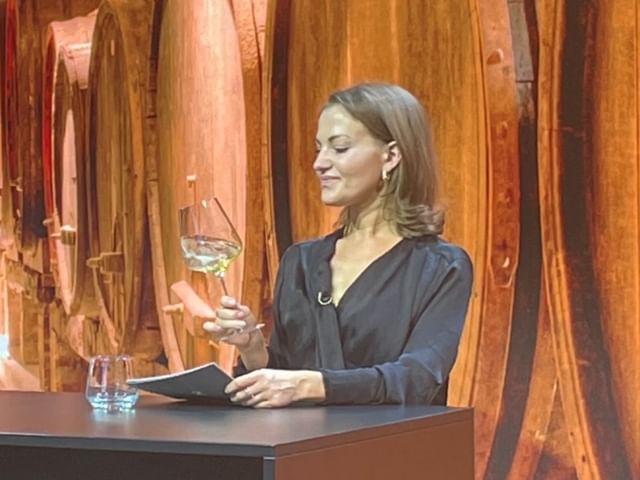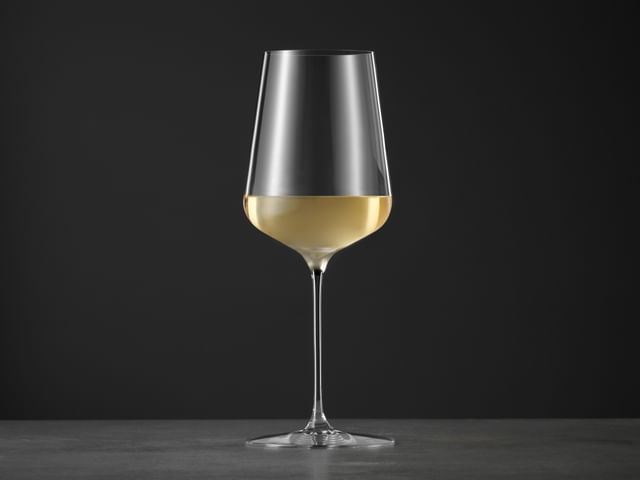Sommelier's Choice
Winzersekt Nr. 3 by Moritz Kissinger: Pop the Future: Why German Sekt Has Never Been This Good

Isabel Claire Zentgraf, sommelier and wine expert, recommends Moritz Kissinger's Winzersekt Nr. 3. This biodynamic cuvée from Rheinhessen combines Chardonnay, Pinot Blanc and Pinot Noir. With its pure, unfiltered production and maturation on the full lees, the sparkling wine displays an impressive balance of freshness, depth and minerality. For an optimal taste experience, we recommend the SPIEGELAU Definition Universal glass, which brings out the complex aromas perfectly. A masterpiece of German sparkling wine craftsmanship at an international level.

The sommelier
Isabel Claire Zentgraf discovered her passion for wine and good food during her studies, when she worked in various positions in upscale gastronomy. Today she works as a business consultant in an international corporation, but in her free time she devotes herself to a completely different mission: getting to the bottom of the fascination of wine.
With projects such as an English-language wine podcast Between two Bottles, in which she interviews international winemakers, and the wine import/export of the same name in Burgundy, she tries to make wine and knowledge accessible to nerds. Her travels take her around the globe, always in search of the most exciting wine regions and the stories behind the vines.
After completing WSET Level 3, she is now tackling WSET Level 4 in Paris and has spent the past few years studying with prestigious winemakers such as the “Les Jardins vivants” winery in Burgundy. A very special milestone was her own Pinot Noir “Isabel Claire”, which she vinified for the first time in Meursault in 2023 - a creation that bears her personal signature.
The wine recommendation
Winzersekt Nr. 3, Cuvée (Chardonnay, Pinot Blanc, Pinot Noir), Moritz Kissinger, Uelversheim, Rheinhessen, Germany
The Story
We are talking about energy, vibration, length, and salinity—a completely new vocabulary that slips effortlessly off the tongue when discussing German sparkling wine (Sekt). The new generation of German winemakers is showing that they not only honor tradition, but that they can venture into uncharted territory. Moritz Kissinger from Rheinhessen is one of these talents who is striving to redefine the boundaries of German Sekt.
With his Winzersekt Nr. 3, Kissinger presents a sparkling wine that is not only technically brilliant, but also culturally inspired. After years of training and experience at prestigious domains in Champagne, Germany, and England, he returned with a wealth of experience and a clear vision: German Sekt does not have to be a mere replica—it can be an independent expression of terroir and personality.
The Estate
The Kissinger Estate in Uelversheim has long been synonymous with biodynamic viticulture with an uncompromising focus on quality. The calcareous and loess soils, combined with a mix of old and young vines, form the foundation for the estate’s refined and complex wines.
But since Moritz, has taken an active role in the winemaking, a fresh breeze has swept through the Pilgertal Valley in Rheinhessen. Alongside names like Keller and Wittmann, Kissinger’s Chardonnay 22 or his Winzersekt Nr. 1, 2 and 3 are now finding their way into the trunks of passionate wine enthusiasts.
With his open, experimental approach, Moritz Kissinger has transformed the estate into one of the most exciting addresses in Rheinhessen. His wines—whether still or sparkling—bear the signature of a winemaker who respects his roots while still having the courage to forge new ground.
Low sulfur, minimal intervention and maximum precision.
Evenings in the cellar are not just about sales figures and analytic assessments, they revolve around big visions. Discussions often drift towards the magic of beeswax, the analysis of great role models, and spirited debates with friends. This intellectual approach is reflected in the glass—a wine here is not merely a product, but an invitation to engage and reflect.
The Production
The Winzersekt Nr. 3 is a quasi-solera, blending three different vintages to create a wine of exceptional depth. The cuvée consists of 5% 2020, 10% 2021, and 85% 2022.
These vintages combine three varietals - Chardonnay, Weißburgunder (Pinot Blanc), and Spätburgunder (Pinot Noir) - from Uelversheim and the surrounding areas. The grapes were carefully selected, pressed traditionally, and fermented spontaneously.
After the first fermentation in wooden barrels, the wine underwent its second fermentation in the bottle. The Sekt then matured for 18 months on its lees before being disgorged without any dosage. This artisanal method highlights the individual characteristics of the varietals and the mineral richness of the soils in their purest form.
The Wine
In the glass, it reveals a brilliant golden-yellow hue with an elegant, fine mousse. On the nose, citrus and apple notes mingle with subtle hints of brioche and roasted almonds. A salty minerality weaves its way through the aromatic profile like a constant thread.
On the palate, the Sekt showcases an impressive balance between freshness and depth. The lively acidity is rounded out by a creamy texture, while the wine’s precision and clarity are captivating. The decision to forgo dosage amplifies its pure, refined elegance.

The Glass
Complexity needs space. That's why I recommend the SPIEGELAU Definition Universal Glass for Winzersekt Nr. 3. With its finely balanced shape, it highlights the multi-layered aromas of citrus, brioche and roasted almonds. The generous opening allows the minerality and depth of the sparkling wine to be optimally perceived. Its feather-light design not only makes it a pleasure to enjoy, but also to analyze.
Conclusion
With Winzersekt Nr. 3, Moritz Kissinger exemplifies with finesse what German Sekt can achieve on the international stage. This sparkling wine is not just a testament to skilled craftsmanship, but a bold declaration to the future of German Sekt.
Photos: Isabel Claire Zentgraf, Sommelier-Union Deutschland e.V.
Locations